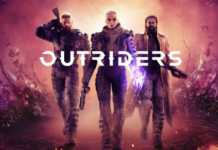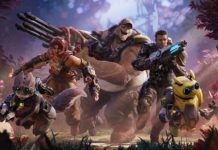Anyone who wants to work in the gaming business must be passionate — I think that goes without saying. Still, it's a breath of fresh air when you receive a demo or interview from someone who knows how to show their enthusiasm and project that excitement onto others. Jon Heiner, game director at Realta, is an example of a developer who knows how to make you believe. At E3, I had the chance to talk to him about his first gaming project, BandFuse: Rock Legends.
BandFuse, much like Ubisoft's Rocksmith, is a rhythm game that features a full guitar experience as opposed to the 5-button experience typically associated with Rock Band and Guitar Hero. It currently supports guitar, bass, and vocals, although they were primarily showing off guitar at the show. Realta hopes to differentiate BandFuse from the competition through authenticity. They claim their technology offers a zero latency experience and the use of tablature, guitar's equivalent to sheet music, instead of exploding gems will teach BandFuse players how to read any guitar magazine or lesson book. By the sound of it, Realta has a no compromises approach to creating their guitar experience.

Despite being new to the scene, Realta pulled in a growing list of names from the rock industry to assist them in development. Slash, Zakk Wyld, and Nancy Wilson are already tied to the project, and there's no telling if there will be more to come. Bringing so many musicians on board gives Realta the ability to create perfect to near perfect tabs of the songs. "This is how the part is played." Jon Heiner told me, in reference to Slash's song Back From Cali. "I know this, because I asked Slash." It sounded like the legends would also play a role in teaching the player guitar techniques, telling rock stories, and motivating the player to keep picking up his or her instrument. The legends are integrated into the experience and aren't just names on the box to sell copies.
Realta has also courted favor from John Nady, developer of a wide array of wireless music technology. For BandFuse, Nady has developed the guitar cable that ships with every copy of the game and an acoustic guitar attachment to allow players to use their acoustic guitars in the game. That's right. For the first time in a game, songs like Drive by Incubus can be played using the proper type of guitar. Unfortunately, since they use their game is designed around their technology, Rocksmith's guitar cable has too much latency to be usable in BandFuse. Jon also showed me an audio adapter that will ship with their game that allows the player to plug a pair of headphones directly into the Xbox. There's a surprising amount of tech being developed for BandFuse; all in the effort to allow players to play how they want.

Realta wants BandFuse to be more than just a personal journey; they want it to be a social experience. Every time you play a song in BandFuse, your performance is recorded. Afterward, you can upload that recording to their BandFuse cloud and share it with friends or even ask someone to record a backing track to combine with your leads. They were not showing any of the social aspects of BandFuse at E3, but Jon described it as one of the three major pillars supporting their game. The ability to share is woven into the fabric of BandFuse, but we'll have to wait to see how it all plays out.
Any good guitarists knows you don't become great without practice. BandFuse's practice options were not finalized by my E3 appointment, but they understand how crucial practice can be to an experienced player. They know they want to make practicing simple, fun, and worthwhile. Realta also plans to build tutorials to help players learn and get better at guitar. Jon told me they want to "Game-ify guitar practice," and they may be on their way to accomplishing just that.

After my interview with Jon, I strapped on one of the guitars and tried out some of the tracks. I played through Reptilia by The Strokes and Harder to Breathe by Maroon 5 on two of the intermediate difficulties and had varying experiences. Multipliers in the thirties and fourties were not uncommon during Reptilia, but I couldn't even break ten in Harder to Breathe. It was hard to tell if the difference in score was because of the software, an out of tune guitar, or just my mediocre guitar playing. E3 is not the best venue to test a game with so many things that could go wrong. I will say the scoring system is more strict than Rocksmith, but not as restrictive as Rock Band 3's pro guitar. You still have the freedom to play what you want during guitar breaks, and you are never punished for not playing what's in the tablature. Your multiplier will slowly decrease if you aren't playing the notes as they are shown, but you will never fail out of a song.
I had low expectations walking into BandFuse. Rhythm gaming has gone through a lot of turbulence the past few years, and I'm incredibly skeptical of new IPs in the genre. Rocksmith felt like a lucky strike, but BandFuse may solidify this as a trend. Rhythm gaming could be reborn with a focus on learning and playing real instruments. Based on what I saw at E3, BandFuse could easily lead that charge.










